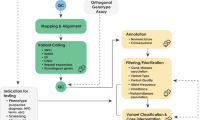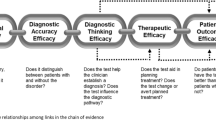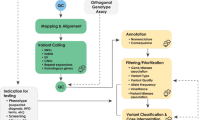Abstract
The development of new massive sequencing techniques has now made it possible to significantly reduce the time and costs of whole-genome sequencing (WGS). Although WGS will soon become a routine testing tool, new ethical issues have surfaced. In light of these concerns, a systematic review of papers published by expert authors on IC or specific ethical issues related to IC for WGS analysis in the clinical setting has been conducted using the Pubmed, Embase and Cochrane Library databases. Additionally, a search was conducted for international ethical guidelines for genetic studies published by scientific societies and ethical boards. Based on these documents, a minimum set of information to be provided to patients in the IC form was determined. Fourteen and seven documents from the database search and from scientific societies, respectively, were selected. A very high level of consistency between them was found regarding the recommended IC form content. Pre-test counselling and general information common to all genetic tests should be included in the IC form for WGS for diagnostic purposes, but additional information addressing specific issues on WGS are proposed, such as a plan for the ethical, clinically oriented return of incidental findings. Moreover, storage of additional information for future use should also be agreed upon with the patient in advance. Recommendations for WGS studies in the clinical setting concerning both the elements of information and the process of obtaining the IC as well as how to handle the results obtained are proposed.
Similar content being viewed by others
Log in or create a free account to read this content
Gain free access to this article, as well as selected content from this journal and more on nature.com
or
References
Human Genome Project Information, http://www.ornl.gov/sci/techresources/Human_Genome/home.shtml (Accessed 20 June 2012).
National Human Genome Research Institute, http://www.genome.gov/11006943 (Accessed 20 June 2012).
Biesecker LG : Opportunities and challenges for the integration of massively parallel genomic sequencing into clinical practice: lessons from the ClinSeq project. Genet Med 2012; 14: 393–398.
Welch JS, Westerlvet P, Ding L et al: Use of whole-genome sequencing to diagnose a cryptic fusion oncogene. JAMA 2011; 315: 1577–1584, (*).
Lunshof JE, Bobe J, Aach J et al: Personal genomes in progress: from the Human Genome Project to the Personal Genome Project. Dialogues Clin Neurosci 2010; 12: 47–60.
Haga SB, Terry SF : Ensuring the safe use of genomic medicine in children. Clin Pediatr 2009; 48: 703–708, (*).
Foundation for Genomics and Population Health: Next steps in the sequence, the implications of whole genome sequencing for health in the UK. PHG Foundation: Cambridge, MA, 2011, http://www.phgfoundation.org/reports/10364/ (Accessed 20 June 2012).
Ku Ch-S, Wu M, Cooper DN et al: Technological advances in DNA sequence enrichment and sequencing for germline genetic diagnosis. Expert Rev. Mol. Diagn 2012; 12: 159–173, (*).
Christenhusz GM, Decriendt K, Dierickx K : To tell or not to tell? A systematic review of ethical reflections on incidental findings arising in genetics contexts. Eur J Hum Genet 2012, e-pub ahead of print, 27 June 2012 doi:10.1038/ejhg.2012.130.
Asociación Española de Genética Humana: Consentimiento informado para la realización de pruebas diagnósticas http://aegh.org/images/cidiagnostico.pdf (Accessed 20 June 2012).
British Society for Human Genetics: Consent and Confidentiality in Genetic Practice: Guidance on Genetic Testing and Sharing Genetic Information; Report of the Joint Committee on Medical Genetics 2006 http://www.bshg.org.uk/documents/official_docs/consent_pages_web.pdf (Accessed 20 June 2012).
Swiss Society of Medical Genetics Informed choice in diagnostic genetic testing. 2007, http://www.sgmg.ch/user_files/images/Einverst%C3%A4ndniserkl%C3%A4rung%20SGMG%20erg%C3%A4nzt%20E%202007.pdf (accessed 20 June 2012).
Ali-Khan SE, Daar AS, Shuman C, Ray PN, Scherer SW : Whole genome scanning: resolving clinical diagnosis and management amidst complex data. Pediatr Res 2009; 66: 357–363, (*).
Netzer C, Klein C, Kohlhase J et al: New challenges for informed consent through whole genome array testing. J Med Genet 2009; 46: 495–496, (*).
Ormond KE, Wheeler MT, Hudgins L et al: Challenges in the Clinical application of whole-genome sequencing. Lancet 2010; 375: 1749–1751, (*).
Ransohoff DF, Khoury MJ : Personal genomics: information can be harmful. Eur J Clin Invest 2010; 40: 64–68, (*).
Sharp RR : Downsizing genomic medicine: Approaching the ethical complexity of whole-genome sequencing by starting small. Genet Med 2011; 13: 191–194, (*).
Sijmons RH, Van Langen IM, Sijmons JG : A clinical perspective on ethical issues in genetic testing. Account Res 2011; 18: 148–162, (*).
Raffan E, Semple RK : Next generation sequencing—implications for clinical practice. British Med Bull 2011; 99: 53–71, (*).
Berg JS, Khoury MJ, Evans JP : Deploying whole genome sequencing in clinical practice and public health: Meeting the challenge one bin at a time. Genet Med 2011; 113: 499–504, (*).
Green RC, Berg JS, Berry GT et al: Exploring concordance and discordance for return of incidental findings from clinical sequencing. Genet Med 2012; 14: 405–410, (*).
Hastings R, De Wert G, Fowler B et al: The changing landscape of genetic testing and its impact on clinical and laboratory services and research in Europe. Eur J Hum Genet 2012; 20: 911–916, (*).
Thorogood A, Knoppers BM, Dondorp WJ : Whole-genome sequencing and the physician. Clin Genet 2012; 81: 511–513, (*).
Organisation for Economic Co-operation and Development: OECD guidelines for quality assurance in molecular genetic testing 2007, http://www.oecd.org/dataoecd/43/6/38839788.pdf (Accessed 20 June 2012).
Eurogentest: Recommendations for genetic counselling related to genetic testing 2008, http://www.eurogentest.org/web/info/public/unit3/final_recommendations_genetic_counselling.xhtml (Accessed 20 June 2012).
WMA Statement on Genetics and Medicine. Adopted by the 56th WMA General Assembly, Santiago, Chile, October 2005 and amended by the 60th WMA General Assembly, New Delhi, India, October 2009, http://www.wma.net/en/30publications/10policies/g11/ (Accessed 20 June, 2012).
Dondorp WJ, de Wert GM The ‘thousand-dollar genome’: an ethical exploration, Monitoring Report Ethics and Health, 2010/2. The Hague: Centre for Ethics and Health 2010, http://www.gezondheidsraad.nl/en/publications/thousand-dollar-genome-ethical-exploration (Accessed 20 June 2012).
Human Genomes Strategy Group: Building on our inheritance,Genomic technology in healthcare. A report by the Human Genomics Strategy Group, January 2012, http://www.dh.gov.uk/en/Publicationsandstatistics/Publications/PublicationsPolicyAndGuidance/DH_132369 (Accessed 20 June 2012).
American College of Medical Genetics and Genomics (ACMG): Policy Statement, Points to Consider in the Clinical Application of Genomic Sequencing, March 2012, http://www.acmg.net/StaticContent/PPG/Clinical_Application_of_Genomic_Sequencing.pdf (Accessed 20 June 2012).
Dimmock D : A personal perspective on returning secondary results of clinical genome sequencing. Genome Med 2012; 4: 54.
Bunnik EM, Schermer MH, Janssens AC : The role of disease characteristics in the ethical debate on personal genome testing. BMC Med Genom 2012; 5: 4.
Macarthur DG : Challenges in clinical genomics. Genom Med 2012; 4: 43.
Samuels ME, Orr A, Guernsey DL et al: Is gene discovery research or diagnosis? Genet Med 2008; 10: 385–390.
Facio FM, Eidem H, Fisher T et al: Intentions to receive individual results from whole-genome sequencing among participants in the ClinSeq study. Eur J Hum Genet 2012, e-pub ahead of print, 15 August 2012 doi:10.1038/ejhg.2012.179.
Acknowledgements
We are grateful to Oliver Shaw for his editorial assistance.
Author information
Authors and Affiliations
Corresponding author
Ethics declarations
Competing interests
The authors declare no conflict of interest.
Web Resources
Nuffield Council on Bioethics ( http://www.nuffieldbioethics.org/)The Spanish Committee on Bioethics (http://www.comitedebioetica.es/) Human Genome Organisation (http://www.hugo-international.org/) Eurogentest (http://www.eurogentest.org) The organisation for economic co-operation and development (http://www.oecd.org) Spanish Society of Human Genetics (http://www.aegh.org/) Foundation for Genomics and Population Health (http://www.phgfoundation.org/) European Society of Human Genetics (https://www.eshg.org) British Society of Human Genetics (http://www.bshg.org.uk/) Swiss Society of Medical Genetics (http://www.sgmg.ch/view_page_professional.php) American Society of Human Genetics (http://www.ashg.org/) American College of Medical Genetics (http://www.acmg.net) HumGen International (http://www.humgen.org )
Rights and permissions
About this article
Cite this article
Ayuso, C., Millán, J., Mancheño, M. et al. Informed consent for whole-genome sequencing studies in the clinical setting. Proposed recommendations on essential content and process. Eur J Hum Genet 21, 1054–1059 (2013). https://doi.org/10.1038/ejhg.2012.297
Received:
Revised:
Accepted:
Published:
Issue date:
DOI: https://doi.org/10.1038/ejhg.2012.297
Keywords
This article is cited by
-
What can the citations of systematic reviews of ethical literature tell us about their use?—an explorative empirical analysis of 31 reviews
Systematic Reviews (2023)
-
‘It’s a nightmare’: informed consent in paediatric genome-wide sequencing. A qualitative expert interview study from Germany and Switzerland
European Journal of Human Genetics (2023)
-
Parents’ understanding of genome and exome sequencing for pediatric health conditions: a systematic review
European Journal of Human Genetics (2022)
-
Information, communication, and cancer patients’ trust in the physician: what challenges do we have to face in an era of precision cancer medicine?
Supportive Care in Cancer (2021)
-
Communicating genetic information to family members: analysis of consent forms for diagnostic genomic sequencing
European Journal of Human Genetics (2020)



